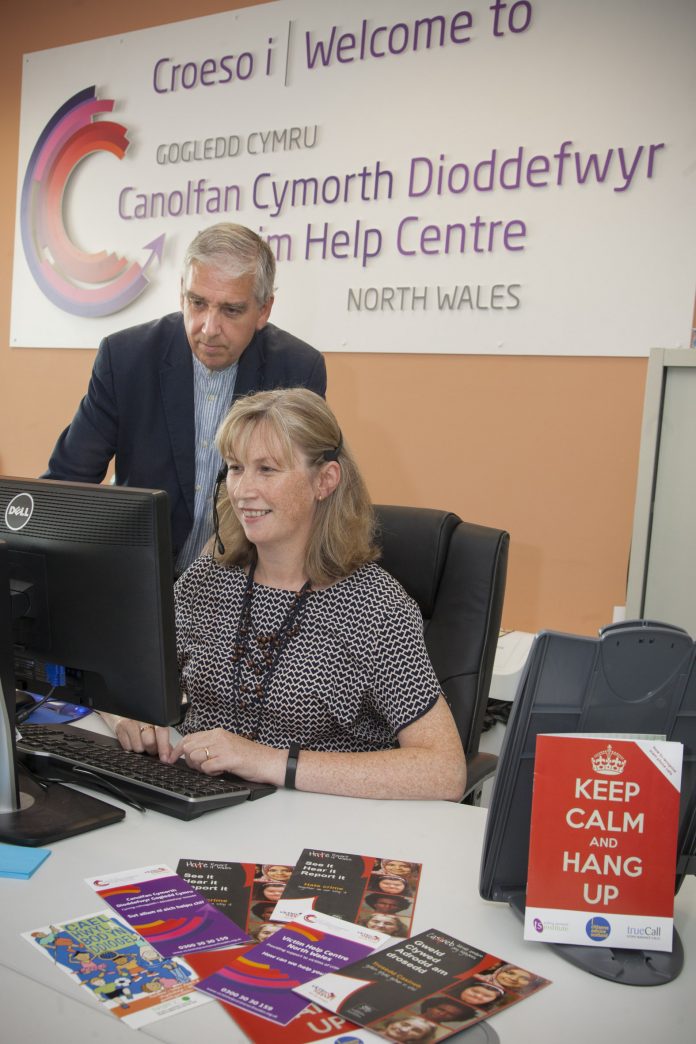
Boys and girls as young as eight years of age in North Wales are sexting – especially during the summer holidays when they have more time on their hands.
North Wales Police and Crime Commissioner Arfon Jones heard that youngsters sending and receiving sexually explicit messages via apps like Snapchat or Instagram on their mobile phones is a growing problem.
Mr Jones, a former police inspector, was also told there’s also evidence the youngsters are being targeted by online paedophiles seeking to groom them.
The news was revealed to the commissioner during a briefing at the Victim Help Centre which opened in July last year.
Since then the centre has handled the cases of more than 18,000 victims of all sorts of crimes.
The one-stop-shop for victims covers the whole of North Wales and is based at divisional police HQ in St Asaph.
It brings together the support services of North Wales Police, the Witness Care Unit of the Crown Prosecution Service (CPS) and the former Victim Support organisation.
Each victim receives a response specifically tailored to their situation and the centre employs specialists in mental health and hate crime.
About 9,700 people were identified as vulnerable or repeat victims and have gone on to benefit from an enhanced support package.
The centre has now launched an appeal to find up to 25 new volunteers to work with them across North Wales.
Victim help officer Karen Reed said: “We’ve has some cases of children who have experienced sexting who are under 10 years old, as young as eight or nine years old. It doesn’t seem to discriminate between boys or girls really.
“Young people have access to mobile phones from a very young age, and especially now, a time like summer holidays when children are out and about playing with their friends.
“The children will send photographs of various pictures to each other. They’ll be pornographic, explicit photographs – sometimes of themselves, sometimes they’re sharing photographs that have maybe been passed on to them from various sources.
“I think it would be very difficult to say that there are many children now who haven’t been touched by this type of crime. That’s my experience of it here anyway.
“They may have the technological skills, however they obviously haven’t got the maturity to be able to deal with that.
“What we will do is we will directly support the parents in order to help them keep their children safe really.
“Parents incredibly concerned and they want to know if it is a matter exchanging photographs or if it has been a case of grooming.”
According to Karen, adults, particularly young men between 18 and 30, were also falling victim to online blackmailers
She added: “They have all the access to the latest technology but they are falling victim to crimes, in particular exchanging photographs and videos.
“What happens then is the person they think they’re actually exchanging and talking with is not the person who they think it is and then there will be demands and menaces for money and blackmail. That is happening in North Wales – anecdotally I’d say we’re having those sorts of reports weekly.
The team of a dozen highly-trained staff and 35 outreach volunteers at the centre is managed by Julie Elliott who previously worked for the Childline charity set up by TV presenter Esther Ranzen.
She was proud a survey had shown that 90 per cent of the victims who took part were satisfied or very satisfied with the service they received from the team.
Julie said: “Being a victim of crime can impact people in many ways and there are many reasons why people don’t necessarily go to the police in the first instance.
“I think having service where the person can reach out to talk about what happened in a confidential space is really crucial.
“We encounter all kinds of crimes, everything from theft, assault, burglary, sexual offences and harassment. We’re making a difference, and that’s what we want to continue doing.
“We do need more volunteers. We’re looking for people who are reliable, who are available to train and can meet the victims face to face, and listen to them and support them through whatever it is.”
Arfon Jones said: “The Victim Help Centre is providing an absolutely vital service, giving much needed support to those who have unfortunately been on the receiving end of a whole range of crimes.
“I’m glad to say that North Wales is a safe place to live and we have a very low crime rate but we do still have victims and the impact crime has upon them can be profound.
“Looking after the needs of victims is a major priority for me and the issue will be front and centre in my Police and Crime Plan which provides a blueprint for the policing of North Wales.
“The sheer volume of cases dealt with by the centre is a clear illustration of how much this service is needed and they are making a real difference.
“The centre is also geared up to deal with the new problems caused by the changing face of society.
“Sexting by children is a relatively new and worrying phenomenon and one that we must confront and tackle.
“It is important that we educate youngsters about the perils of this dangerous practice and that we provide and their concerned parents with support to deal with the situation.
“At the same predatory paedophiles are becoming increasingly sophisticated so it is vitally important children and parents are alerted the threats they pose.
“Technological advances have brought great benefits to society but at the same time they have increased risk and the scope for wrongdoing, so we must be vigilant.”
The victim help service is available from 8am-8pm Monday to Friday and 9am-5pm on Saturdays. It can be contacted by Freephone on 0300 3030159, by email at: northwales.helpcentre@victimsupport.org.uk, or via the websites www.victimhelpcentrenorthwales.org.uk or www.canolfangymorthiddioddefwyrgogleddcymru.org.uk



























